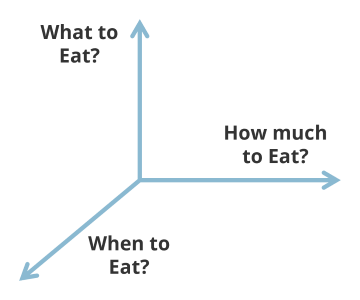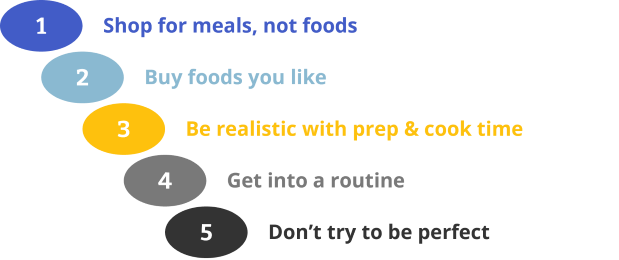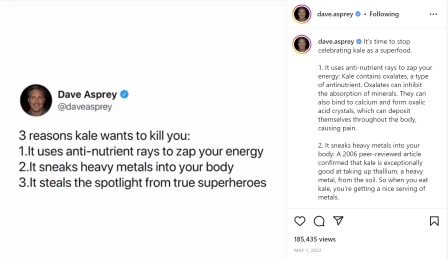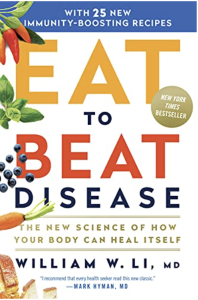Issue #5: Dave Asprey's War on Kale
Good morning. It’s Friday, Aug 19th. Thanks for sticking with us for our first week! We hope you like what we’re serving up. Next week we’re going to focus on Movement.
But before we get to that, don’t miss today’s read.
Each Friday we'll provide a summary of the week's key insights and lead you into the weekend with our featured - Friday Flex Workout. Today's Flex is probably part of John Stamos’ routine - how is that guy turning 58 today??
“Your entire life changes the day that you decide you will no longer accept mediocrity for yourself.”
Got feedback? Tell us what you think at team@thrive25.com.
If someone forwarded this email to you or you found us on the web, be sure to sign up for our newsletter here.
The additional years a 50-yr old can expect to live if they follow these 5 lifestyle recommendations from the Harvard School of Public Health:
Don’t smoke
Don’t drink excessively
Get at least 30 min of moderate to vigorous exercise a day
Maintain a “normal” weight
Eat a “healthy diet”
Weekly Insights
Here are 5 Key Takeaways from this week's theme - "Going to the Farmacy"
1. To optimize your nutrition - think of it along 3 Dimensions
2. These Grand Slam Fruits will supercharge our defense systems
3. Eat your Veggies - 3 per day (try to include broccoli)
4. Make Food a Priority with a plan for shopping, meal prep, and preventing food waste:
5. If You Eat the Skin = Buy Organic
What’s the Deal With…
Some topics we cover are somewhat controversial and the science or expert opinion isn't settled. We're not here to push an agenda, so we'll give you both sides of the argument with the facts to help you decide what's best for you.
Bananas
Bananas are great - just look at the potassium!
Wait...no, bananas have too much sugar!
Bananas are the most popular fruit in the U.S. - 63% of Americans eat them. So should we eat them?
In short - yes. Bananas are mostly good for you - giving you things like prebiotic fiber for your gut bacteria.
But...the sugar goes up as bananas ripen (like a lot), so tips for bananas:
Eat them before they get too ripe (any brown spots)
Mix with fat or protein (banana and nut butter might be the best snack in the world)
Don't eat more than 1 per day
Grapes
How popular are grapes?? Well we grow 72 million tons annually.
But grapes can be considered sugar bombs. In fact, Levels Health (a continuous glucose monitoring company) has found that grapes are one of the top "surprising" foods that spike blood sugar.
On the other hand, another continuous glucose monitoring company, Nutrisense, promotes grapes' low glycemic index - with studies suggesting they are even safe for those with Type 2 diabetes.
So what's the verdict? Well if you're really trying to lose weight or your tests show high glucose/insulin results, then, unless prescribed by your dietician or doctor, it's probably best to ditch the grapevine and switch over to berries.
Otherwise, if they don't bother your gut, then a few grapes are fine and can be good for you. Like bananas, try to eat 'em with some fat or protein to lessen the sugar spike (like in a chicken or salmon salad).
Dave Asprey's War on Kale
Bulletproof Founder/Biohacker Dave Asprey loves to hate on kale.
He argues that it contains an "anti-nutrient" that actually brings more toxins into the body than it removes and shouldn't be on anyone's personal menu.
It's true, cruciferous veggies in particular - like kale, spinach, cauliflower, broccoli - contain oxalic acid (oxalate). This acid binds to calcium in the blood and can cause muscle pain, stomach irritation, and in severe cases kidney stones.
People have different sensitivity to oxalates. According to The Cleveland Clinic, the majority of people won't have any problems consuming these plants at recommended levels.
It should also be noted that kale isn't actually that high in oxalates compared to other greens. It has 17 mg, compared to spinach with 755 mg (see full list of foods high in oxalates).
So is Dave wrong? Not necessarily. This is very personal and it’s important to be aware of the specific risks for you if kale or any other veggie cause gut problems.
Plus, kale does absorb pretty much everything in the soil around it. It will collect whatever metals or pesticides are in the surrounding soil and these toxins can be an "anti-nutrient" - if it's in the kale it'll be in you. So it's essential to buy organic kale (and spinach) - see Issue #4.
If you find eating raw veggies does cause any digestive discomfort:
Reduce how much you eat
Try steaming the veggies before eating them
Take magnesium and zinc supplements - great minerals that reduce oxalate absorption
Or the easy one - just eat something else!
If you're really concerned, check with your doc about a gut imbalance or sensitivity issue.
What We’re Reading
We all have cancer. 50% of men over 50 have microscopic cancer in their prostate and just about 100% over 70 have microscopic cancer in their thyroid gland.
This is how Dr. William Li starts Eat to Beat Disease. It’s not to scare us - rather to relieve us.
Our DNA makes 10,000 mistakes every single day so cells getting messed up (cancerous) is inevitable. Fortunately, our bodies are designed to handle these situations and make it so that in most cases, these cancerous cells never become a problem.
Before getting into all the foods that can extend our lives and help us thrive (many of which we’ve outlined this week), Dr. Li outlines our 5 defense mechanisms:
Angiogenesis
Regeneration
Microbiome
DNA protection
Immunity
Our bodies are incredibly complex and this summary obviously can’t come close to doing justice to how they really work. If you are interested in learning more, check out the book on Audible or Amazon. Don't have the time - we'll be dedicating space in upcoming issues to each of these mechanisms.
Friday Flex
At Thrive25, we personally struggle with extremely tight quads and hip flexors - you know those muscles right next to your groin that connect your core to your quads (more technical definition from Physiopedia). Seems like no matter how often we stretch them (which isn’t enough), they are always tight.
Check out this quick 2 min video from Aaron Alexander, author of The Align Method, to help increase flexibility with our hip flexors:
Have a great weekend! Before we go...
Cool Fact - The Edge, U2 Lead Guitarist, is a Director at the Angiogenesis Foundation (he gave a review of Eat to Beat Disease).
Thanks to Sing 2, my 5-yr old daughter is belting out U2 songs - hope they stick around until I can take her to a concert.
A little old school classic to kick off the weekend - appreciate you all!
Check out the latest workout videos on our YouTube channel
Got feedback? Tell us what you think at team@thrive25.com
Want this direct to your inbox? Sign up here
Why Thrive25
We’re 40-something dads that felt our bodies and minds start to slow down and we’re not ready for that. We found too much information on every subject. So we started Thrive25 to transform what we’ve learned into something useful for the rest of us to spend just 3-5 min a day to optimize our health & longevity.
This newsletter is for you and we truly value your feedback. Never hesitate to reach out to us at team@thrive25.com.
To health!
Sign up for free:
The information in this newsletter is for informational purposes only and may not be appropriate or applicable based on your individual circumstances. Thrive25, Inc. does not provide medical, professional, or licensed advice. Please connect with your healthcare professional for medical advice specific to your health needs.












